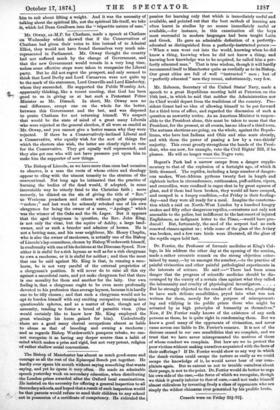The Bishop of Manchester has almost as much good-sense and
courage as all the rest of the Episcopal Bench put together. He hardly ever opens his mouth without saying something that wants saying, and yet he opens it very often. He made an admirable speech yesterday week on secondary education, when distributing the London prizes awarded after the Oxford local examinations. He insisted on the necessity for offering a general inspection to all Secondary schools, and hoped that a result of such inspection would be that parents would refuse to send their children to any school not in possession of a certificate of competency. He ridiculed the
passion for learning only that which is immediately useful and available, and pointed out that the best methods of learning are often learnt in studies by no means immediately useful or available,—for instance, in this examination all the boys most successful in modern languages had been taught Latin and Greek. He gave an admirable definition of a perfeetly- educated as distinguished from a perfectly-instructed person :— " When a man went out into the world, knowing when he did know a thing, knowing when he did not know a thing, and knowing how knowledge was to be acquired, he called him a per- fectly educated man." That is true wisdom, though it will hardly recommend itself to Manchester quite as cordially as to its Bishop. Our great cities are full of well "instructed " men ; but of "perfectly educated " men they count, unfortunately, very few.


































 Previous page
Previous page